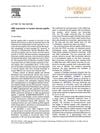 18 citations,
October 2014 in “Experimental Dermatology”
18 citations,
October 2014 in “Experimental Dermatology” Local skin glucocorticoid production is crucial for healthy skin, and its disruption can lead to skin diseases.
 January 2025 in “Applied Sciences”
January 2025 in “Applied Sciences” Sulforaphane from broccoli may help treat certain cancers, hormone issues, and hair loss.
 1 citations,
August 2020 in “Food Research”
1 citations,
August 2020 in “Food Research” Plant extracts like Avicennia marina, Boehmeria nipononivea, and Camellia sinensis could potentially treat hair loss with fewer side effects than synthetic drugs.
 11 citations,
December 2018 in “Assay and Drug Development Technologies”
11 citations,
December 2018 in “Assay and Drug Development Technologies” Natural herbal compounds might treat certain medical conditions by reducing DHT levels, but more research is needed to confirm their effectiveness and safety.
 November 2023 in “Frontiers in Neuroendocrinology”
November 2023 in “Frontiers in Neuroendocrinology” Some people experience lasting sexual, psychological, and sleep problems after using finasteride or SSRI antidepressants, possibly due to similar underlying causes.
 20 citations,
April 2012 in “Fertility and Sterility”
20 citations,
April 2012 in “Fertility and Sterility” Finasteride causes lasting fertility decrease in rats.
 August 2023 in “International journal of experimental research and review”
August 2023 in “International journal of experimental research and review” There are effective treatments available for baldness.
 40 citations,
April 2018 in “Endocrine”
40 citations,
April 2018 in “Endocrine” PFS and PSSD are similar conditions with persistent sexual dysfunction after stopping medication.
 18 citations,
June 2009 in “Journal of Molecular Endocrinology”
18 citations,
June 2009 in “Journal of Molecular Endocrinology” Finasteride exposure harms tadpole reproduction and hormone balance.
 56 citations,
June 2001 in “European journal of cardiovascular prevention & rehabilitation”
56 citations,
June 2001 in “European journal of cardiovascular prevention & rehabilitation” Early balding linked to higher heart disease risk.
 12 citations,
March 2004 in “International Journal of Dermatology”
12 citations,
March 2004 in “International Journal of Dermatology” A woman with X-linked chronic granulomatous disease developed lupus-like skin lesions, improved with treatment, suggesting a unique skin condition in carriers.
 1 citations,
December 2023 in “Curēus”
1 citations,
December 2023 in “Curēus” Most children with a common hemochromatosis genotype had elevated iron levels but no severe symptoms.
 6 citations,
January 2016 in “International Journal of Andrology”
6 citations,
January 2016 in “International Journal of Andrology” Bald men may have a lower risk of testicular cancer.
 65 citations,
February 2009 in “The journal of investigative dermatology/Journal of investigative dermatology”
65 citations,
February 2009 in “The journal of investigative dermatology/Journal of investigative dermatology” Anti-acne medications may work by reducing the activity of a protein involved in acne development.
 34 citations,
October 2011 in “Pathology Research International”
34 citations,
October 2011 in “Pathology Research International” Behçet's Disease may be caused by genetic and environmental factors leading to abnormal immune responses, and stress management and new treatments could improve patient outcomes.
 May 2012 in “Reactions Weekly”
May 2012 in “Reactions Weekly” A man developed hair loss from testosterone treatment but improved with additional medication.
March 2023 in “Natural product sciences” Celtis choseniana may help treat hair loss by reducing androgen effects and boosting hair growth signals.
 April 2003 in “Experimental Dermatology”
April 2003 in “Experimental Dermatology” The workshop highlighted the genetic links and psychological impacts of hair loss and skin disorders.
 165 citations,
February 2014 in “Phytotherapy Research”
165 citations,
February 2014 in “Phytotherapy Research” Myrtle has various health benefits and potential for medicine development.
 165 citations,
December 2002 in “Molecular and Cellular Endocrinology”
165 citations,
December 2002 in “Molecular and Cellular Endocrinology” Male hormones, particularly DHT, are linked to male pattern hair loss, and treatments like finasteride can help, but they don't work for postmenopausal women's hair loss, which may have different causes.
 91 citations,
August 2015 in “Anais Brasileiros De Dermatologia”
91 citations,
August 2015 in “Anais Brasileiros De Dermatologia” Female Pattern Hair Loss affects women's self-esteem and needs more research for better treatment.
 14 citations,
March 2014 in “Journal of The European Academy of Dermatology and Venereology”
14 citations,
March 2014 in “Journal of The European Academy of Dermatology and Venereology” Young adults with hair loss face higher risk of stiff arteries.
 January 2003 in “Humana Press eBooks”
January 2003 in “Humana Press eBooks” Dihydrotestosterone and 5α-Reductase play a role in hair loss and prostate health, and finasteride can increase hair growth in men without affecting sperm production, but it doesn't work for postmenopausal women with hair loss.
 38 citations,
June 2017 in “The Journal of Dermatology”
38 citations,
June 2017 in “The Journal of Dermatology” Aging in hair follicle stem cells leads to hair graying, thinning, and loss.
 7 citations,
July 2005 in “Journal of Dermatological Science”
7 citations,
July 2005 in “Journal of Dermatological Science” The gene URB is more active in human hair growth cells and responds to a hair-related hormone.
 18 citations,
March 2008 in “British Journal of Dermatology”
18 citations,
March 2008 in “British Journal of Dermatology” Finasteride works better for hair loss in patients 26 or younger.
 May 2024 in “Skin research and technology”
May 2024 in “Skin research and technology” Certain metabolites can either protect against or increase the risk of hair loss.
 46 citations,
June 2015 in “Journal of Investigative Dermatology”
46 citations,
June 2015 in “Journal of Investigative Dermatology” Androgen receptor activity blocks Wnt/β-catenin signaling, affecting hair growth and skin cell balance.
 237 citations,
December 2001 in “Urology”
237 citations,
December 2001 in “Urology” Blocking the enzyme 5α-reductase can shrink the prostate and help treat enlarged prostate issues.
 42 citations,
January 2014 in “Cold Spring Harbor Perspectives in Medicine”
42 citations,
January 2014 in “Cold Spring Harbor Perspectives in Medicine” Hair growth is influenced by various body and external factors, and neighboring hairs communicate to synchronize regeneration.





























